Conviction 'Extremely Likely' in George Floyd's Death, Says Ex-Dallas ADA Who Successfully Prosecuted Cop for Murder
Securing a murder conviction of a police officer is difficult and rare, but ex-prosecutor Mike Snipes did it. He's analyzed the charges against Minneapolis ex-officer Derek Chauvin and says a conviction is "extremely likely" for George Floyd's death.
June 04, 2020 at 12:57 PM
5 minute read
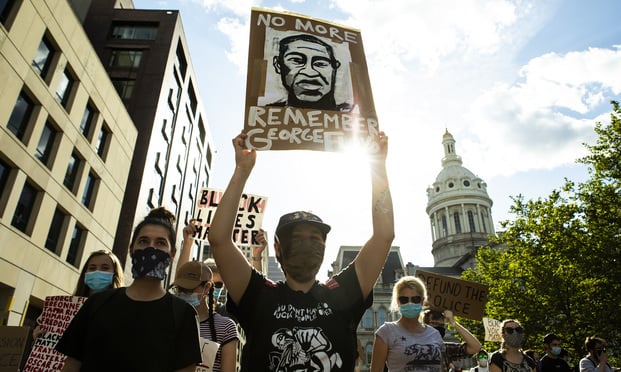 Thousands march in Baltimore on Monday protesting police brutality and the killing of George Floyd in Minnesota at the hands of local police. Mass demonstrations have taken place nationwide since the incident took place. Photo: Diego M. Radzinschi/ALM
Thousands march in Baltimore on Monday protesting police brutality and the killing of George Floyd in Minnesota at the hands of local police. Mass demonstrations have taken place nationwide since the incident took place. Photo: Diego M. Radzinschi/ALM
Prosecutors in the criminal case against former Minneapolis police officer Derek Chauvin for George Floyd's death have an "extremely likely" chance of winning a conviction, according to former prosecutor Mike Snipes.
His opinion comes from key experience: Snipes is one of the few prosecutors that has successfully prosecuted a murder case against an officer. Convictions in such cases are very rare.
At the time in 2018, Snipes was first assistant district attorney in Dallas County. He prosecuted Roy Oliver, a white police officer in Balch Springs who shot and killed 15-year-old Jordan Edwards, who was black, as Edwards was leaving a house party.
Read more: Litigator of the Week: A Rare Murder Conviction of a Police Officer
Chauvin's charges are second-degree murder and second-degree manslaughter for placing his knee on Floyd's neck for more than eight minutes until Floyd died. In addition, three other officers who were present when Floyd died are also facing charges, according to a CNN article. J. Alexander Kueng, Thomas Lane and Tou Thao were charged Wednesday with aiding and abetting second-degree murder.
We talked to Snipes, who is now a visiting judge in the First Administrative Judicial Region, to ask about his legal analysis of the case against the officers. Here are his answers, edited for brevity and clarity.
Texas Lawyer: What are your personal thoughts and feelings about the death of George Floyd, and the nationwide protests?
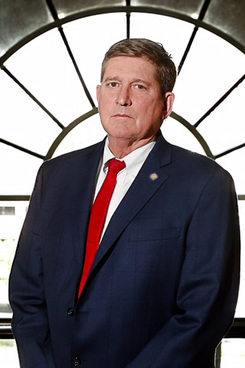 Michael Snipes. Photo: Tracy Nanthavongsa
Michael Snipes. Photo: Tracy NanthavongsaJudge Mike Snipes: The death is a horrible tragedy and the last thing in the world we needed right now with the pandemic going on. It couldn't have happened at a worst time. I fully, totally, 110% support the protests and demonstrations. These peaceful protests have been ruined to a degree by infiltrators causing violence, looting and vandalism. That has no place—ever.
Four former officers involved in his death are now facing criminal charges. I know it's difficult to win a conviction against an officer. Can you explain why?
Juries want to believe police officers, because police officers are the ones who protect them. They are loathe to second guess them when they have such dangerous jobs that require split-second decision making many times. That's why it's difficult, in a nutshell.
Can you share your legal analysis of the strengths and weaknesses of the murder and manslaughter charges against former Minnesota officer Derek Chauvin?
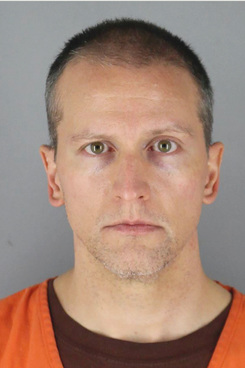 Derek Chauvin. Photo: Hennepin County Sheriff's Office
Derek Chauvin. Photo: Hennepin County Sheriff's OfficeWell in Texas, it appears we have a similar statutory framework as in Minnesota. You can have a murder conviction if you intend to cause serious bodily injury, committed in a clear danger to human life, that results in death. Assuming that they have a similar statutory framework in Minnesota, that would be the backing that I would guess [Minnesota Attorney General Keith Ellison] would go with. I don't know what that officer meant—it's nothing good—but what he did was an action that would have caused serious bodily injury. It did. It did result in death. I think the conviction on him is extremely likely.
The other three former officers—J. Alexander Kueng, Thomas Lane and Tou Thao—are charged with aiding and abetting second-degree murder. What do you think may be the strengths and weaknesses of this case?
There is a very important distinction that needs to be made there: Mere presence at the scene of a crime isn't enough. There needs to be more. There needs to be something those three guys were doing to help out the actual murder. I don't know what it was, but it must be something. They can't just stand there and not do anything. Unless I'm missing something, that's not going to amount to a crime.
Video of the death shows and media has reported that Kueng and Lane helped Chauvin to restrain Floyd.
If they were doing that, then it would do it.
Minnesota Attorney General Keith Ellison has taken over the prosecution of the case. If you were him, how would you approach the prosecution? What would you stress to a jury?
Several things: No. 1, the amount of time that the officer had his knee on that guy's neck. No. 2, that he had to have known Mr. Floyd was in distress: He was yelling he couldn't breathe, and talking about his mother. Another one is that putting a knee on the neck is not an approved law enforcement tactic, anywhere. Not just Minnesota—but anywhere.
Read more: 'I Need to Protect This Prosecution': Minnesota AG Keith Ellison Will Lead George Floyd Case
This content has been archived. It is available through our partners, LexisNexis® and Bloomberg Law.
To view this content, please continue to their sites.
Not a Lexis Subscriber?
Subscribe Now
Not a Bloomberg Law Subscriber?
Subscribe Now
NOT FOR REPRINT
© 2025 ALM Global, LLC, All Rights Reserved. Request academic re-use from www.copyright.com. All other uses, submit a request to [email protected]. For more information visit Asset & Logo Licensing.
You Might Like
View All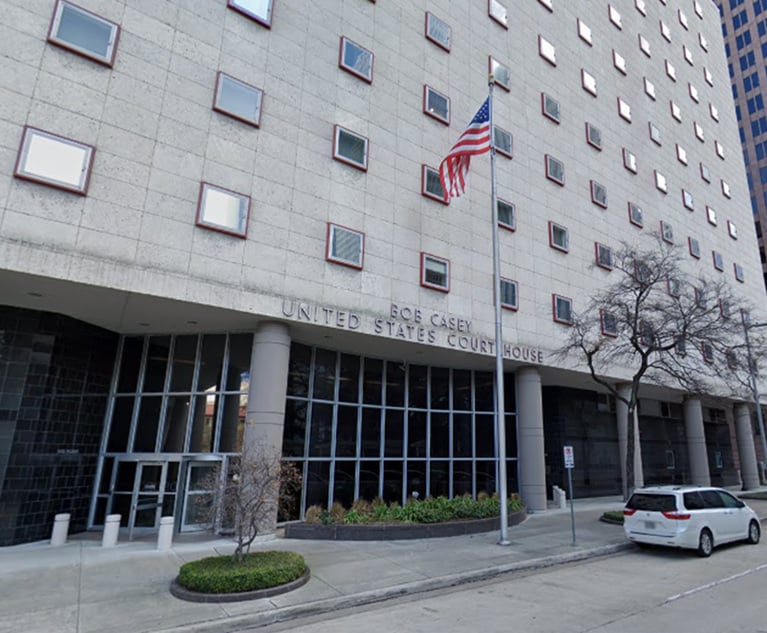
JCPenney Seeks Return of More Than $1.1M From Jackson Walker For Bankruptcy Work
3 minute read
Ex-Appellate Court Judges Launch Boutique Focused on Plaintiffs Appeals
2 minute read
O'Melveny, White & Case, Skadden Beef Up in Texas With Energy, Real Estate Lateral Partner Hires
5 minute read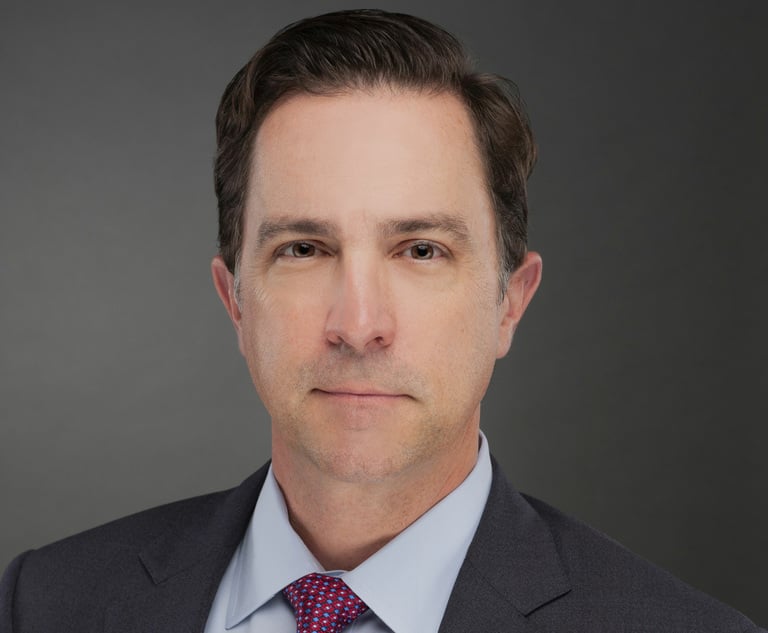
Chamberlain Hrdlicka Taps a New Leader as Firm Follows Succession Planning Path
3 minute readTrending Stories
- 1Decision of the Day: Court Holds Accident with Post Driver Was 'Bizarre Occurrence,' Dismisses Action Brought Under Labor Law §240
- 2Judge Recommends Disbarment for Attorney Who Plotted to Hack Judge's Email, Phone
- 3Two Wilkinson Stekloff Associates Among Victims of DC Plane Crash
- 4Two More Victims Alleged in New Sean Combs Sex Trafficking Indictment
- 5Jackson Lewis Leaders Discuss Firm's Innovation Efforts, From Prompt-a-Thons to Gen AI Pilots
Who Got The Work
J. Brugh Lower of Gibbons has entered an appearance for industrial equipment supplier Devco Corporation in a pending trademark infringement lawsuit. The suit, accusing the defendant of selling knock-off Graco products, was filed Dec. 18 in New Jersey District Court by Rivkin Radler on behalf of Graco Inc. and Graco Minnesota. The case, assigned to U.S. District Judge Zahid N. Quraishi, is 3:24-cv-11294, Graco Inc. et al v. Devco Corporation.
Who Got The Work
Rebecca Maller-Stein and Kent A. Yalowitz of Arnold & Porter Kaye Scholer have entered their appearances for Hanaco Venture Capital and its executives, Lior Prosor and David Frankel, in a pending securities lawsuit. The action, filed on Dec. 24 in New York Southern District Court by Zell, Aron & Co. on behalf of Goldeneye Advisors, accuses the defendants of negligently and fraudulently managing the plaintiff's $1 million investment. The case, assigned to U.S. District Judge Vernon S. Broderick, is 1:24-cv-09918, Goldeneye Advisors, LLC v. Hanaco Venture Capital, Ltd. et al.
Who Got The Work
Attorneys from A&O Shearman has stepped in as defense counsel for Toronto-Dominion Bank and other defendants in a pending securities class action. The suit, filed Dec. 11 in New York Southern District Court by Bleichmar Fonti & Auld, accuses the defendants of concealing the bank's 'pervasive' deficiencies in regards to its compliance with the Bank Secrecy Act and the quality of its anti-money laundering controls. The case, assigned to U.S. District Judge Arun Subramanian, is 1:24-cv-09445, Gonzalez v. The Toronto-Dominion Bank et al.
Who Got The Work
Crown Castle International, a Pennsylvania company providing shared communications infrastructure, has turned to Luke D. Wolf of Gordon Rees Scully Mansukhani to fend off a pending breach-of-contract lawsuit. The court action, filed Nov. 25 in Michigan Eastern District Court by Hooper Hathaway PC on behalf of The Town Residences LLC, accuses Crown Castle of failing to transfer approximately $30,000 in utility payments from T-Mobile in breach of a roof-top lease and assignment agreement. The case, assigned to U.S. District Judge Susan K. Declercq, is 2:24-cv-13131, The Town Residences LLC v. T-Mobile US, Inc. et al.
Who Got The Work
Wilfred P. Coronato and Daniel M. Schwartz of McCarter & English have stepped in as defense counsel to Electrolux Home Products Inc. in a pending product liability lawsuit. The court action, filed Nov. 26 in New York Eastern District Court by Poulos Lopiccolo PC and Nagel Rice LLP on behalf of David Stern, alleges that the defendant's refrigerators’ drawers and shelving repeatedly break and fall apart within months after purchase. The case, assigned to U.S. District Judge Joan M. Azrack, is 2:24-cv-08204, Stern v. Electrolux Home Products, Inc.
Featured Firms
Law Offices of Gary Martin Hays & Associates, P.C.
(470) 294-1674
Law Offices of Mark E. Salomone
(857) 444-6468
Smith & Hassler
(713) 739-1250






